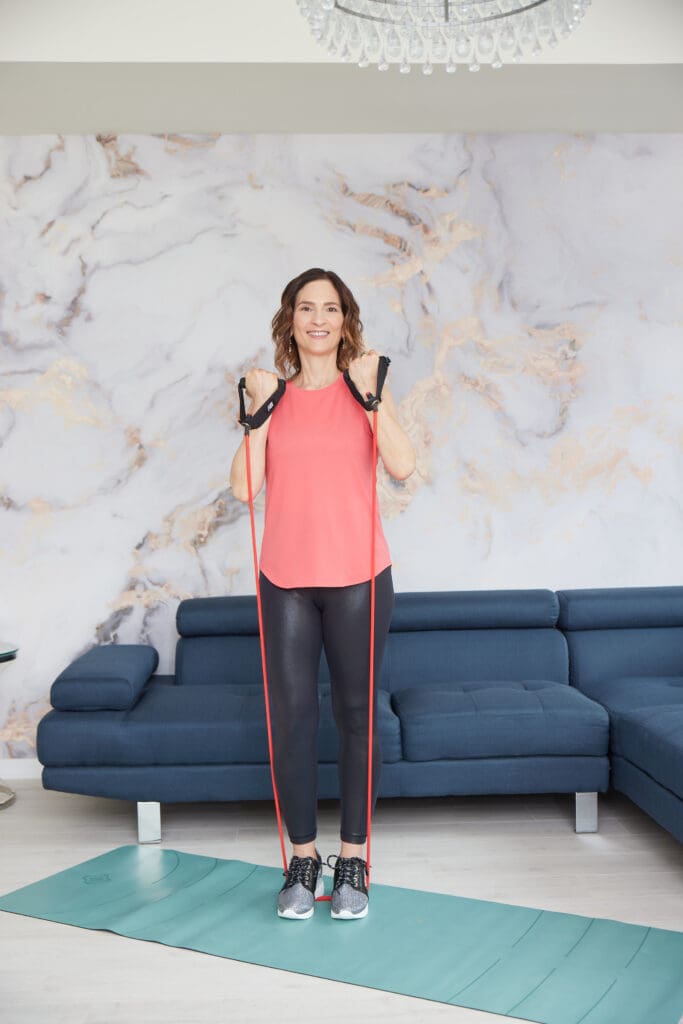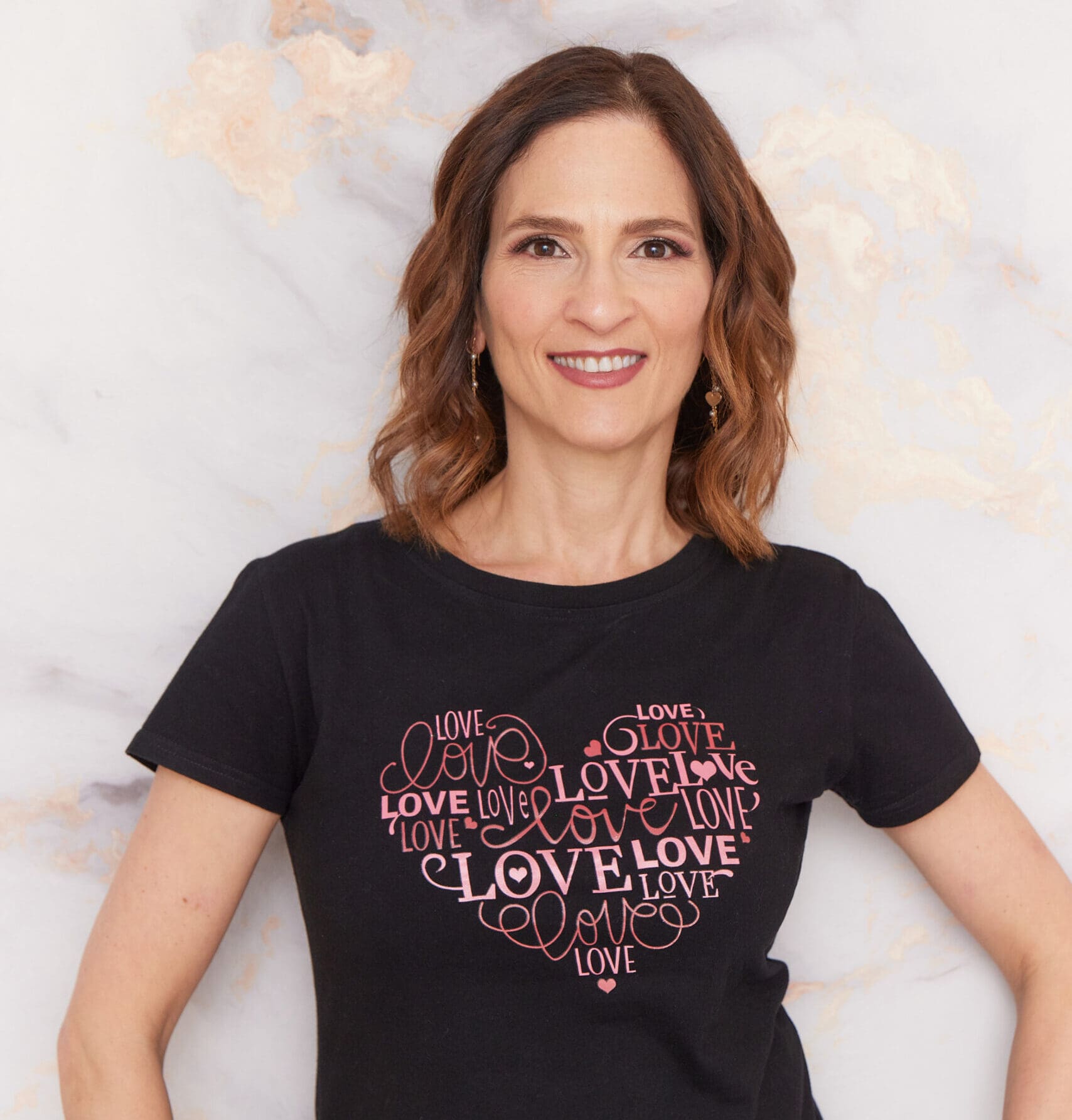According to the Menopause Association of Canada, there are more than 10 million women over the age of 40 in Canada, making up more than one-quarter of the population. Despite the size of this cohort, their health care and societal needs related to menopause have largely been ignored. We chatted with Canadian menopause educator and women’s health crusader, Andrea Donsky, host of the podcast Menopause Reimagined, to learn more. —Noa Nichol
Hi Andrea! When and why did you become interested in/an advocate for menopause? Why is advocacy/education needed around this subject?
I had my third child at 41 and started to experience symptoms soon after that never went away. At 47 I got my first hot flash and that is when I made the connection between how I had been feeling and menopause. I didn’t even know the word perimenopause existed until I started to dig into the research. As a Nutritionist, it is my job to understand my body, so when I realized how little I knew about this stage of life I made a promise to myself, and others, that I would learn as much as I could about menopause and then share what I learn with my community. That’s why I am now known as the Menopause Educator and Menopause Researcher to my community. Education about perimenopause and menopause is important because women represent 50 percent of the population, yet we aren’t taught about it in school, my mom never talked to me about it, I never spoke about it with my friends or colleagues, and my health care providers didn’t mention it to me as a possibility for all the symptoms I would share that I was experiencing. We need to learn more about menopause so we can manage our symptoms better and understand how to fully live and embrace this new phase of life.
Your podcast is called Menopause Reimagined; what does this idea mean to you, and what sorts of topics do you cover?
My business partner, Randy Boyer, and I wanted to change the conversation around menopause, that is why we started our company, Morphus. My idea of menopause before understanding anything about it was that it was for older people, not women in her 40’s or 50’s. Menopause Reimagined is our company’s tagline, so it is woven into everything we do at Morphus to change the conversation around perimenopause and menopause. We not only want to normalize it, which in turn will take away the shame and stigma associated with it. We want to help women improve their quality of life in perimenopause and menopause by offering them support, education and solutions for their symptoms.
According to the Menopause Association of Canada, there are more than 10 million women over the age of 40 in Canada, making up more than one-quarter of the population. Despite the size of this cohort, their health care and societal needs related to menopause have largely been ignored. Why do you think that is?
I think there are four main reasons. Unfortunately women’s health is often dismissed and even gaslit, even though we represent 50% of the population. I hear this all the time on my TikTok page. Women share stories of how their doctors dismissed their feelings or told them to just deal with it. Most of the research, in general, is conducted on males, so more research is needed on women particularly over the age of 40. This is one reason why my company is on a mission to conduct anecdotal observational research for women in perimenopause and menopause. We currently have four research surveys on our website that we are collecting data for, and we recently released the results from the Signs and Symptoms survey on my TikTok page and in our newsletter. Another reason is I believe women may not know what questions to ask. Like myself, I had no idea what was happening to my body, so when you aren’t aware of something, you don’t have the vocabulary to verbalize how you’re feeling. And there is also a big difference when it comes to generations. Baby boomers were more quiet about menopause. They didn’t talk openly about it, there was a shame and stigma attached to it, whereas many of us GenXers are starting to break free of that mould and are talking about it.
Can you share with us some common misconceptions and shed light on what to really expect before, during and after menopause?
Myth #1: You’re too young to be in menopause, even if you’re in your 40’s and 50’s.
Fact: Perimenopause can start as early as 35, and sometimes earlier. It’s generally 7 to 12 years before you go into menopause.
Myth #2: There are only ‘34’ symptoms of menopause. Not true! Through my research over the last 6 years, I’ve personally tracked more than 85 signs and symptoms of menopause (I coined the term “85+ signs and symptoms of menopause.”) There are actually over 100, but some of them overlap.
Myth 33: We have to suffer through our symptoms because there is nothing you can do to minimize or eliminate them.
Fact: There are many options these days from nutrition, to lifestyle, supplements and/or hormones if you choose that route.
We’ve heard of hot flashes, weight gain and mood swings when it comes to menopause symptoms, but what are some lesser-known menopausal symptoms, along with your best tips on how to alleviate the discomfort?
I released the results of a menopause research survey where we received more than 2700 responses from women in perimenopause and menopause. It is very exciting because as a menopause researcher I’m super passionate about educating people on what is happening to our bodies during this time. According to our research, the number one most common symptoms is fatigue. Some less known symptoms include itchy ears, bruising, eye twitches, vertigo, dizziness, nausea, digestive issues, shoulder pain, acid reflux, frequent urination, food cravings, clumsiness, etc. I have videos on my TikTok page under my ‘Educational playlist’ that provide solutions for many of these less common symptoms.
What’s the difference between perimenopause, menopause and postmenopause?
Perimenopause is the years before menopause, they can last anywhere from a few months to more than 12, even 14 years. It can start anytime after the age of 35, generally a decade before you go into menopause. Menopause is once you’ve gone 12 months, or 365 days without a cycle. It’s technically just one day. The average age of menopause in North America is 51½. This is when your sex hormones (like estrogen, progesterone and testosterone) are in the menopausal ranges. PostMenopause is everything after menopause. I consider menopause and postmenopause to be the same thing. Once we are in menopause, we are in it for the rest of our lives (similar to puberty).

You’re also a nutritionist; what are your best nutrition, lifestyle and supplement tips for living your best life during each of these phases of life?
I always say what worked for us BEFORE perimenopause and menopause, may not work for us when we are in it, so changing our mindset when it comes to many facets of our life is really important. When it comes to nutrition, focusing on eating whole foods is important. Getting enough protein (20 to 30 grams per meal), quality fats (think avocados, olives, olive oil, avocado oil, coconut oil, ghee, grass fed butter), vegetables, low glycemic fruits, legumes, complex carbohydrates and nuts and seeds. Making sure you get enough fiber (25 to 35 grams a day). Staying well hydrated. Aim for ½ your weight in ounces daily. Minimizing alcohol, processed sugar and processed carbs. Also making sure you’re eating enough is really important. More than 50% of women in this phase of life gain weight (myself included!) so it makes sense to think eating less can help us to shed weight. However, it’s actually the opposite. When we don’t eat enough our body holds onto weight more. When it comes to exercise, be mindful of what you are doing. Aim for 15-20 minutes of HIIT and weight bearing exercises. Managing our stress levels is also important. Walks in nature, watching funny movies, spending time with people you love can all help to stimulate the parasympathetic part of our nervous system, which helps us to relax. And finding the support you need is also very important. I also believe we need to take supplements. The World Health Organization said that our soils are deficient in minerals, so supplementing our diets can help us to feel better, especially because there are safe supplements these days that can help to alleviate many of our symptoms, including hot flashes, night sweats, mood swings, etc.
What’s the one piece of advice you’d give to a woman embarking on menopause?
To be gentle with yourself. It is a difficult time for many of us. In perimenopause our bodies are recalibrating so we need to be patient with the process. Speaking to ourselves with kindness, with respect is key. We can be harder on ourselves than we are on others so we need to show ourselves grace.

March 10th, 2025 at 9:09 am
canadian pharmacy world
https://expresscanadapharm.com/# Express Canada Pharm
canada drugs online reviews